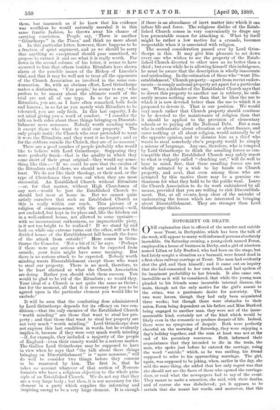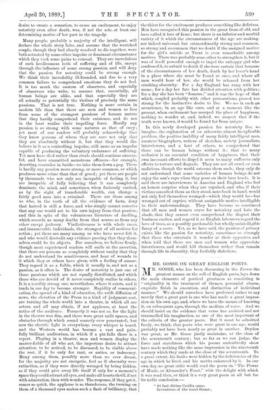NOTORIETY OR DEATH.
ONE explanation that is offered of the murder and suicide near Trent, in Derbyshire, which has been the talk of
the week, will appear to many well-informed persons absolutely incredible. On Saturday evening, a young clerk named Feron, employed in a house of business in Derby, and a girl of nineteen named Lilian or Lily Burford, who had been on the stage, but had lately sought a situation as a barmaid, were found dead in a first-class railway-carriage at Trent. The man had evidently shot the girl, and then himself; and it came out on inquiry that she had consented to her own death, and had spoken of its imminent probability to her friends. It also came out, incredible as it will be considered, that while the young man pleaded to his friends some incurable internal disease, the main, though not the only motive for the girl's assent to the crime, was a passionate desire for notoriety. The two were lovers, though they had only been acquainted three weeks; but though there were obstacles to their union, Feron being dependent on his father, and Miss Burford being engaged to another man, they were not of the insur- mountable kind, certainly not of the kind which would be likely even in the romantic to produce despair of life. Indeed, there were no symptoms of despair. Both were perfectly cheerful on the morning of Saturday, they were enjoying a day's holiday together, and the man at least was not at the end of his pecuniary resources. Both informed their acquaintance that they intended to die in the train, the man, who spoke just before he entered the carriage, using the word "suicide," which, as he was smiling, his friend supposed to refer to his approaching marriage. The girl, again, was supposed to be joking, when, earlier in the day, she said the same thing, she added that her only regret was that she should not see the faces of those who opened the carriage. door, or read what the newspapers had to say of the event. They meant to make a sensation, she said, with their deaths, and of course she was disbelieved; yet it appears to be certain that she meant her words, and moreover, that this desire to create a sensation, to cause an excitement, to enjoy notoriety even after death, was, if not the sole, at least one determining motive of her part in the tragedy.
Many people, probably a majority of the intelligent, will declare the whole story false, and assume that the wretched couple, though they had clearly resolved to die together, were both actuated by some other impulse or dominant circumstance which they took some pains to conceal. They are incredulous of such heedlessness both of suffering and of life, except through the influence of some strong passion, and will deny that the passion for notoriety could be strong enough. We think their incredulity ill-founded, and due to a very common failure to comprehend emotions they do not feel. It is too pinch the custom of observers, and especially of observers who write, to assume that, essentially, all human beings are alike, and that especially they are all actually or potentially the victims of precisely the same passions. That is not true. Nothing is more certain in modern life than that there are men and women so free from some of the strongest passions of human nature that they hardly comprehend their existence, and do not in the least realise their impelling force. Hardly any passion is so strong with some natures as that of envy ; yet most of our readers will probably acknowledge that they know persons of whom they are sure not only that they are absolutely without it, but that they would dis- believe in it as a controlling impulse, still more as an impulse capable of producing the voluntary endurance of suffering. Yet men have died rather than rivals should continue success- ful, and have committed monstrous offences—for example, deserting comrades in battle—to take them down a peg. There is hardly any passion more strong, or more common, or which produces more crime than that of greed ; yet there are people by thousands who not only are incapable of feeling it, but are incapable of fully believing that it can completely dominate the mind, and sometimes, when furiously excited, as by the sight of transferable wealth, can change a fairly good man into a criminal. There are those among us who, in the teeth of all the evidence of facts, deny that hatred is still a force, and who simply cannot conceive that any one would act to his own injury from that passion ; and this in spite of the voluminous literature of duelling, which records as many deaths from that source as from any other except jealousy. Vindictiveness is with whole races, and innumerable individuals, the strongest of all motives for action ; yet there are many among us who have never felt it, and who would discredit any evidence proving that they them- selves could be its objects. For ourselves, we believe firmly, though most experienced readers will smile at the assertion, that there are persons so completely without vanity that they do not understand its sensitiveness, and hear of wounds to it which they or others have given, with a feeling of amaze. They regard it as a foible, which it usually is, and not as a passion, as it often is. The desire of notoriety is just one of those passions which are not equally distributed, and which those who are devoid of it never completely realise in others. It is a terribly strong one, nevertheless, where it exists, and it tends in our day to become stronger. Rapidity of communi- cation, the spread of a kind of education, the swift diffusion of news, the elevation of the Press to a kind of judgment-seat, are turning the whole world into a theatre, in which all are actors, and all may obtain, if not applause, at least the notice of the audience. Formerly it was not so, for the light in the theatre was dim, and there were great unlit spaces, and obstacles through which sound scarcely ever penetrated; but now the electric light is everywhere, every whisper is heard, and the Western world has become a vast and pain- fully bYilliant auditorium, in which if a phi falls there is a report. Playing in a theatre, men and women display the master-foible of all who act, the imperious desire to attract attention, to be noticed, to be discussed, to be visible above the rest, if it be only for rant, or antics, or indecency. Many among them, possibly more than we ever dream, for the majority are not energetic, feel as if obscurity were extinction, as if they were directly wronged by being hidden, as if they could give away life itself if only for a moment's space they could attract all eyes, and make all hearts thrill, if not with admiration, then with wonder. The response, if they get it, comes so quick, the applause is so thunderous, the turning on them of a thousand eyes makes such a flash of brilliancy, that the thirst for the excitement produces something like delirium. Men have recognised this passion in the great from of old, and have called it love of fame ; but there is an inferior and morbid variety of it which the circumstances of the age are making, not indeed universal, but extraordinarily strong and common, so strong and so common that we doubt if the assigned motive for the girl's suicide at Trent is even remarkable among motives. There was probably some other to strengthen it, but it was of itself powerful enough to impel the unhappy girl who confessed it, to submit to death if she were certain that because of the circumstances of her death, death by her lover's hand in a place where she must be found at once, and where all men would hear of her, she would be released from her crushing obscurity. For a day England has rung with her name; for a day her fate has divided attention with politics ; for a day she has been "famous ;" and it was the hope of that which, coupled probably with other provocations, proved too strong for the instinctive desire to live. We see in such an occurrence, in an age like ours, and at a moment like the present, when excitement has usurped the place of happiness, nothing to wonder at, and, indeed, we suspect that if the truth were known, it would be found far from unique.
In this newly developed passion for notoriety lies, we imagine, the explanation of an otherwise almost inexplicable problem, the positive inability of many fairly intelligent men, amateur biographers, writers of sketches, society journalists, interviewers, and a host of others, to comprehend that there can be human beings without it ; that to many seclusion is an essential condition of happiness, that their own incessant efforts to dispel it seem to many sufferers only efforts to torture and degrade. They are not all cruel, or even malicious, though the world esteems them such ; they only do not understand that some varieties of human beings do not enjoy the sun's rays when they pour on their bare heads. It is said there are interviewers in America and England who feel an honest surprise when they are repulsed, and who, if their victims assaulted them as they stood, note-book in hand, would not only feel themselves wronged—which they would be—but wronged out of caprice, without assignable motive intelligible to their understandings. They have become so convinced that all men and women crave for notoriety and hate the shade, that they cannot even comprehend the disgust their business excites, and regard it as English labourers regard the love of trees, as a possibly pardonable but wholly unintelligible fancy of a caste. Yet, as we have said, the passion of privacy exists, like the passion for notoriety, sometimes so strongly that those who entertain it wonder at their opposites, and when told that there are men and women who appreciate interviewers, and would kill themselves rather than remain through life in obscurity, they foolishly disbelieve.



































 Previous page
Previous page